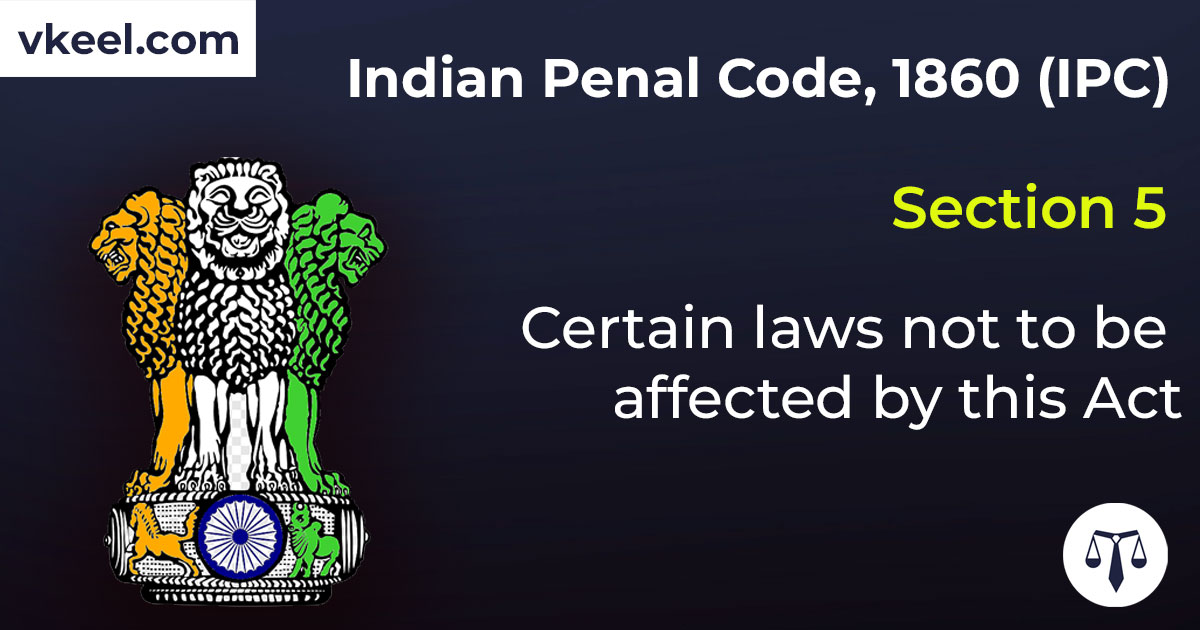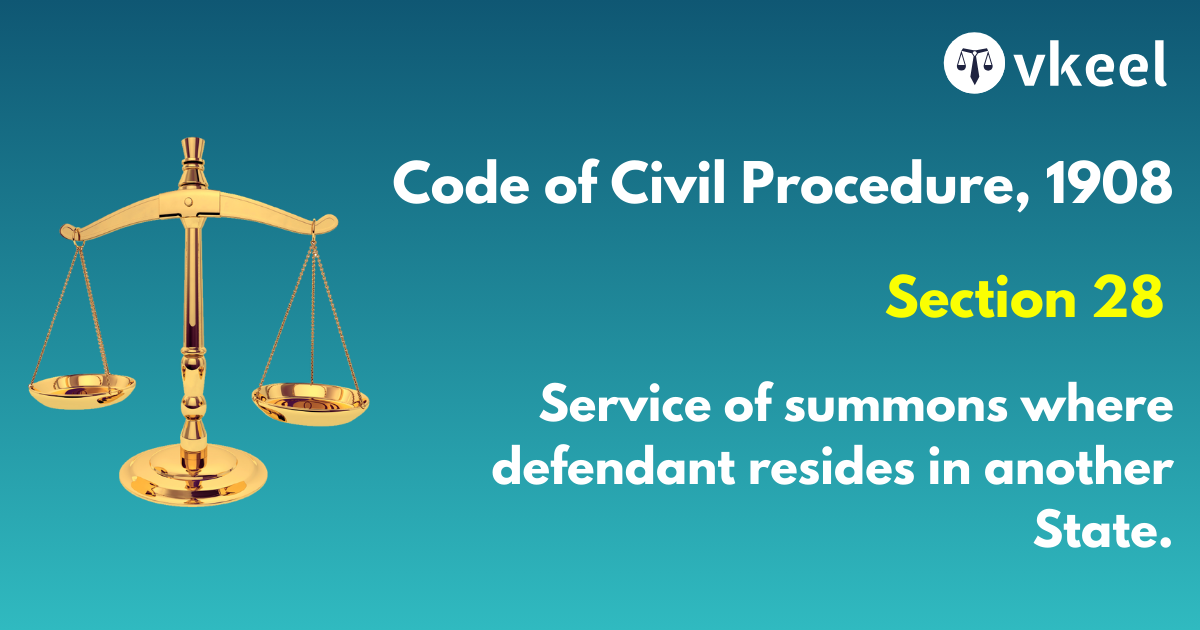Section 5 Indian Penal Code 1860 (IPC) – Certain laws not to be affected by this Act
By Vkeel Team
Table of Contents
Description
“Section 5 Indian Penal Code 1860 (IPC)”
1Nothing in this Act shall affect the provisions of any Act for punishing mutiny and desertion of officers, soldiers, sailors or airmen in the service of the Government of India or the provisions of any special or local law.]
How Section 5 of the Indian Penal Code 1860 Protects Existing Laws
Section 5 of the Indian Penal Code (IPC) 1860 is an important provision that protects existing laws from being violated. It states that any act done in good faith to enforce any existing law or to prevent the violation of any existing law shall not be considered an offence. This section is applicable to all laws in force in India, including the IPC itself.
The purpose of this section is to ensure that people do not take the law into their own hands and that they abide by the existing laws. It also serves to protect those who are enforcing the law from being held liable for any action taken in good faith. This section is particularly important in cases where the law is not clear or where there is a lack of clarity in the interpretation of the law.
Section 5 of the IPC also provides protection to those who are enforcing the law. It states that any act done in good faith to enforce any existing law or to prevent the violation of any existing law shall not be considered an offence. This means that those who are enforcing the law are not liable for any action taken in good faith.
In addition, Section 5 of the IPC also provides protection to those who are accused of violating the law. It states that any act done in good faith to enforce any existing law or to prevent the violation of any existing law shall not be considered an offence. This means that those who are accused of violating the law are not liable for any action taken in good faith.
Overall, Section 5 of the IPC is an important provision that protects existing laws from being violated. It ensures that people do not take the law into their own hands and that they abide by the existing laws. It also provides protection to those who are enforcing the law and those who are accused of violating the law.
Role of Section 5 of the Indian Penal Code 1860 in Legal Reforms
The Indian Penal Code (IPC) of 1860 is a comprehensive criminal code that serves as the primary criminal law of India. Section 5 of the IPC is a crucial part of the code, as it outlines the general exceptions to criminal liability. This section is an important tool for legal reform, as it allows for the consideration of extenuating circumstances in criminal cases.
Section 5 of the IPC states that nothing is an offence which is done by a person who is justified by law, or who by reason of a mistake of fact and not by reason of a mistake of law in good faith, believes himself to be justified by law in doing it. This means that if a person has a reasonable belief that their actions are justified by law, they may be exempt from criminal liability. This is an important provision, as it allows for the consideration of extenuating circumstances in criminal cases.
For example, Section 5 of the IPC allows for the defence of self-defence. If a person is attacked and reasonably believes that their life is in danger, they may use force to defend themselves. This defence is based on the principle that a person should not be held criminally liable for actions taken in self-defence.
Section 5 of the IPC also allows for the defence of necessity. This defence applies when a person commits a crime in order to prevent a greater harm from occurring. For example, if a person steals food to prevent themselves from starving, they may be able to use the defence of necessity.
The provisions of Section 5 of the IPC are an important tool for legal reform. This section allows for the consideration of extenuating circumstances in criminal cases, which can lead to more just outcomes. By allowing for the defence of self-defence and necessity, Section 5 of the IPC helps to ensure that people are not held criminally liable for actions taken in good faith. This section is an important part of the Indian legal system, and it plays an important role in legal reform.
Scope of Section 5 of the Indian Penal Code 1860
Section 5 of the Indian Penal Code 1860 is a broad and comprehensive provision that covers a wide range of offences. It states that “Whoever does any act with such intention or knowledge, and under such circumstances, that, if he by that act caused injury to any person, he would be guilty of an offence, shall be said to do that act with the intention of causing that injury, or with the knowledge that he is likely to cause that injury.”
In other words, Section 5 of the Indian Penal Code 1860 makes it an offence to do an act with the intention of causing injury or with the knowledge that it is likely to cause injury. This section is applicable to all offences, including those that are not specifically mentioned in the Indian Penal Code. It is important to note that the intention or knowledge of the accused must be established in order for the offence to be considered under Section 5.
The scope of Section 5 is wide and covers a variety of offences. It applies to offences such as murder, culpable homicide, grievous hurt, assault, criminal force, wrongful restraint, kidnapping, abduction, mischief, criminal trespass, house-breaking, theft, extortion, cheating, forgery, counterfeiting, and other offences.
In addition, Section 5 also applies to offences that are not specifically mentioned in the Indian Penal Code. For example, if a person drives a vehicle in a reckless manner and causes injury to another person, then the offence would be considered under Section 5. Similarly, if a person manufactures or sells a defective product that causes injury to another person, then the offence would also be considered under Section 5.
In conclusion, Section 5 of the Indian Penal Code 1860 is a broad and comprehensive provision that covers a wide range of offences. It applies to all offences, including those that are not specifically mentioned in the Indian Penal Code. It is important to note that the intention or knowledge of the accused must be established in order for the offence to be considered under Section 5.
1. Subs., ibid., for section 5.
Description Source: indiacode
Disclaimer:
The information provided in the article is for general informational purposes only, and is not intended to constitute legal advice or to be relied upon as a substitute for legal advice. Furthermore, any information contained in the article is not guaranteed to be current, complete or accurate. If you require legal advice or representation, you should contact an attorney or law firm directly. We are not responsible for any damages resulting from any reliance on the content of this website.












